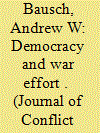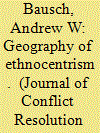| Srl | Item |
| 1 |
ID:
152415


|
|
|
|
|
| Summary/Abstract |
This article uses a laboratory experiment to explore how groups’ internal rules for leader selection affect how leaders select into and fight conflicts. The findings reveal that, counter to expectations, leaders of democratic groups were more likely than leaders of autocratic groups to select into a conflict rather than accept a negotiated settlement. Conditional on conflict occurring, democratic leaders did not mobilize more resources for war than autocratic leaders. However, democratic leaders were less likely to accept a settlement once a war was underway and they expended more effort in the last round of conflict, suggesting once they entered a war they fought for a decisive victory. Domestically, democratic leaders were punished for losing wars more often than autocratic leaders, while winning wars did not benefit democratic leaders significantly.
|
|
|
|
|
|
|
|
|
|
|
|
|
|
|
|
| 2 |
ID:
138078


|
|
|
|
|
| Summary/Abstract |
Hammond and Axelrod use an evolutionary agent-based model to explore the development of ethnocentrism. They argue that local interactions permit groups, relying on in-group favoritism, to overcome the Nash equilibrium of the prisoner’s dilemma and sustain in-group cooperation. This article shows that higher levels of cooperation evolve when groups are dropped from the model, breaking the link between ethnocentrism and cooperation. This article then generalizes Hammond and Axelrod’s model by parameterizing the underlying geographical assumptions they make about the evolutionary environment. This more general model shows that their findings are sensitive to these assumptions and that small changes to the assumed geography of reproduction significantly affect the probabilities of finding ‘‘ethnocentric’’ behaviors. The model presented here indicates that it is not local interactions, per se, but settings where interactions are highly likely to be with close relatives that lead to ‘‘ethnocentrism’’ as modeled by Hammond and Axelrod.
|
|
|
|
|
|
|
|
|
|
|
|
|
|
|
|